
The harrowing scenes of Russia’s invasion of Ukraine have hit close to home for many area Jews in past weeks.
For Jennifer Ferd, a member of Philadelphia’s Russian Speaking Jewish Moishe House, news of the war made her “furious.”
“There really is no need for this,” she said.
Ferd’s best friend is from Ukraine and her stepfather is from Odessa. Knowing her family and friends are in danger overseas made Ferd feel “helpless.”
Moussia Goldstein, who co-directs the Chabad Jewish Center at Drexel University with her husband, is in a similar position.
Her uncle and aunt, Rabbi Avraham and Chaya Wolff, moved to Odessa 20 years ago to rebuild the Jewish community there after decades of Soviet oppression. They set up the Mishpacha Children’s Orphanage — home to 120 children — a senior home for Holocaust survivors, Jewish schools and a synagogue.
On March 2 at 4 a.m., the orphans left Ukraine and arrived in Berlin on March 4 after nearly 60 hours of travel. Many of the children, including a 5-week-old dropped off at the orphanage three weeks prior, had no paperwork. Buses to transport them cost $4,000 each, which the family was able to finance with the assistance of the Ukrainian Chabad community.
Because of Odessa’s proximity to the Moldovian border, the Wolff family was able to assist other Ukranians in crossing the border, only just fleeing the country themselves on March 4.
“The ways these people are getting out are pure, pure miracles,” Goldstein said.
The emotional proximity of the crisis in Ukraine has motivated Philadelphia Jews to double down on efforts to support loved ones and strangers alike overseas.
The Mishpacha Chabad Odessa Emergency Campaign organized by the Wolff family has raised more than $491,000 as of March 7, still only 50% of a $1 million goal.
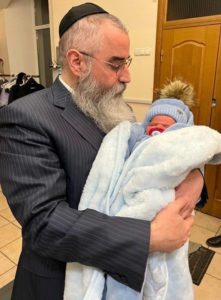
Ferd tried to set up a GoFundMe campaign to support the Philadelphia-based United Ukraine Relief Committee, but the campaign was rejected. She has opted to donate to efforts led by the Perelman School of Medicine at the University of Pennsylvania.
Jewish organizations in the area have organized larger campaigns as part of a national effort to raise dollars for Ukrainian refugees and families.
Andre Krug, president and CEO of KleinLife, who provides support to Russian and Ukrainian immigrants and refugees, many of whom are Holocaust survivors, is not new to this work.
Originally from Kharkiv, Ukraine, Krug, now a Huntingdon Valley resident, has heard the news about bombs detonating near the schools he attended growing up and by the city’s mayor’s office. His wife, originally from Kyiv, had her childhood neighborhood bombed.
“Frankly, I’ve lived in this country for 30-some years, but I never expected it to hit this hard psychologically,” he said.
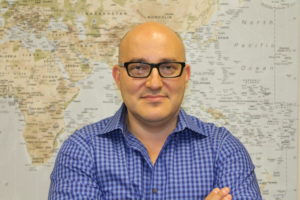
In addition to continuing trauma-informed counseling to restless Ukrainian immigrants in Philadelphia, Krug has encouraged others to donate to the Jewish Federation of Greater Philadelphia’s Ukraine Emergency Fund.
“I prefer to do monetary support because it’s cheaper to buy stuff there [in Ukraine]. So if you give money to reputable sources like [Jewish] Federation, like JDC (American Jewish Joint Distribution Committee), it’s going to get where it’s supposed to get.”
The Jewish Federations of North America, in partnership with JDC, the Jewish Agency for Israel, World ORT and other organizations, identified a goal of $20 million to raise to support the estimated 200,000 Ukrainian Jews. Forty- to 50,000 of those Jews are “vulnerable populations,” and 10,000 are Holocaust survivors, according to Jewish Federation of Greater Philadelphia President and CEO Michael Balaban.
As of March 4, the Jewish Federation’s campaign exceeded $400,000 in donations.
“The needs are only escalating throughout this crisis,” Balaban said. “We’ve got pillars of the community [and] people that we’ve never heard of just stepping forward to provide
assistance.”
But beyond sending money to reliable sources, many advocates for Ukrainian refugees have their hands tied, warned HIAS Pennsylvania Executive Director Cathryn Miller-Wilson.
“Unfortunately, right now, there’s very little that we’re able to do,” Miller-Wilson said.
HIAS PA is unable to begin resettling Ukrainians until the U.S. government grants Temporary Protected Status to those who have already fled to the U.S. and asylum to those still trying to leave the country.
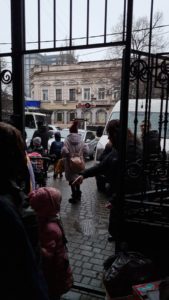
For Ukranians in the U.S. on a temporary visa, the lack of TPS puts them at risk of deportation. Though Ukrainians here permanently can petition for relatives to immigrate, the process can take years, and many of the U.S. consulates in Ukraine are now closed.
Additionally, petitioning occurs through the Lautenberg Amendment, a federal law created in response to the attacks on Soviet Jews, and the amendment needs to be reauthorized every year, which has not been done in 2022.
Miller-Wilson encourages Philadelphia residents, particularly U.S. citizens, to call their Congress members to request that the Biden administration grant refugee status to Ukrainians. She hopes that as the crisis evolves, the U.S. will loosen more bureaucratic restrictions on those trying to flee their war-torn countries.
“Don’t keep being wedded to structures that, even in the best of times, were terrible, and now are useless,” she said
For Jews in particular, supporting Ukrainian refugees goes beyond just showing solidarity for Ukraine, Krug believes.
“Although it plays out in Ukraine, it’s not about Ukraine at all,” Krug said.
Krug argued that Putin’s decision to invade Ukraine is part of a greater effort to rebuild a Soviet stronghold in the region, an attempt that more and more resembles the events of Nazi rule leading up to the Holocaust.
“Every Jewish person should be very sensitive to this issue,” he said.




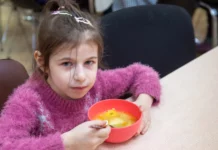
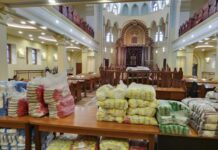

You can donate to the Mishpacha orphanage at Jewsofodessa.com. They are doing incredible work taking care of these children in a new country under extraordinary circumstances! They have left behind everything and now need to arrange room and board, schooling, therapy, trips and more for these kids.